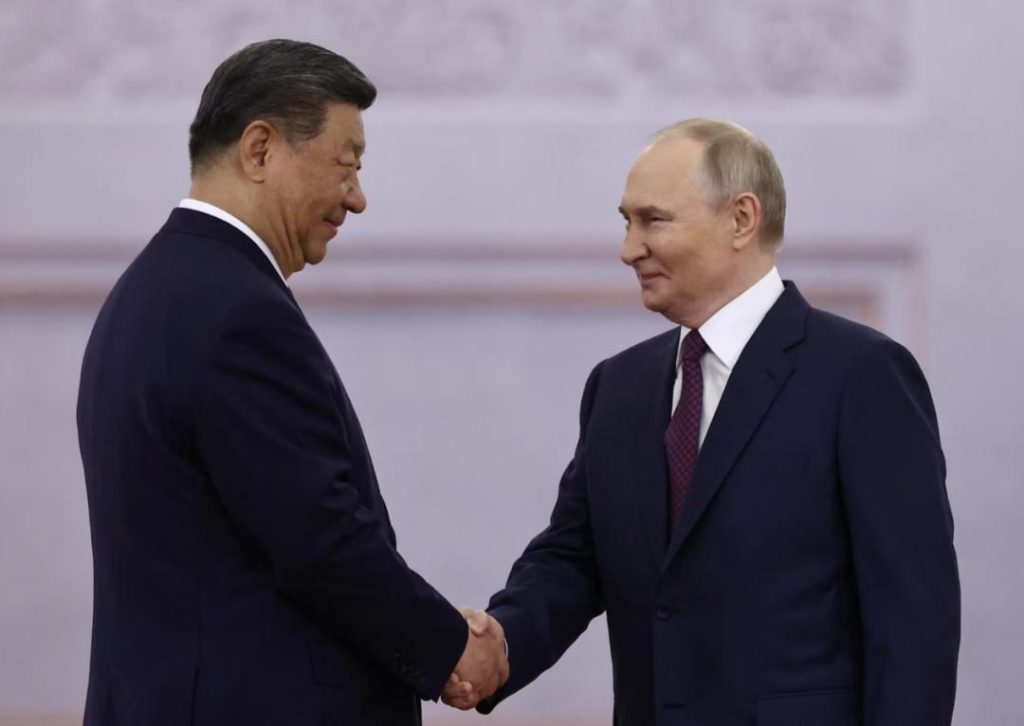
Russia & China Stand United Against Neo-Nazism: Vladimir Putin
In a powerful display of unity and solidarity, Russian President Vladimir Putin stood alongside Chinese President Xi Jinping to commemorate 80 years since the “sacred” victory over Adolf Hitler in World War II. The joint celebration served as a stern warning to neo-Nazism, with Putin emphasizing the importance of the victory and the values it represents.
The meeting took place at the Kremlin on May 8, as Putin greeted Xi with a warm smile and a handshake. The Russian President thanked Xi for joining him in commemorating the anniversary, highlighting the significance of the victory and the sacrifices made by the Soviet Union and China during the war.
“The victory over fascism, achieved at the cost of enormous sacrifices, is of lasting significance,” Putin said, his voice filled with emotion. “It is a testament to the strength and unity of the Soviet people and the Chinese people, who stood together against a common enemy.”
Putin’s words were met with a nod of agreement from Xi, who had traveled to Moscow to mark the occasion. The Chinese President echoed Putin’s sentiments, emphasizing the importance of remembering the past and learning from it.
“We must never forget the lessons of history and the sacrifices made by our ancestors,” Xi said. “We must continue to promote peace, stability, and cooperation, and to oppose neo-Nazism and other forms of extremism.”
The joint celebration was a powerful demonstration of the growing ties between Russia and China, two nations that have become increasingly important players on the world stage. Despite their differences, the two countries have found common ground in their opposition to neo-Nazism and their commitment to promoting peace and stability.
Neo-Nazism, a ideology that glorifies the Nazi regime and its ideals, has been on the rise in recent years, particularly in Eastern Europe and the United States. The ideology is characterized by its racist and anti-Semitic beliefs, and its proponents often seek to undermine democratic institutions and promote violence and hatred.
Russia and China have been vocal in their condemnation of neo-Nazism, and have taken steps to combat its spread. In Russia, the government has banned several neo-Nazi groups and has prosecuted individuals for promoting hate speech and inciting violence. In China, the government has cracked down on extremist groups and has implemented policies aimed at promoting social stability and cohesion.
The joint celebration between Putin and Xi was also seen as a message to the West, particularly the United States, which has been critical of Russia’s actions in Ukraine and its alleged support for neo-Nazism. The Russian President’s comments were seen as a rebuke to the United States, which has been accused of tolerating neo-Nazi groups and promoting a culture of hate and intolerance.
The growing ties between Russia and China have also led to increased cooperation on a range of issues, including trade, energy, and security. The two countries have signed several major deals in recent years, including a $400 billion gas deal and a $50 billion trade agreement.
The joint celebration between Putin and Xi was also seen as a symbol of the growing importance of the Shanghai Cooperation Organization (SCO), a regional security grouping that includes Russia, China, and several Central Asian countries. The SCO has become increasingly important in recent years, as it has sought to promote regional stability and security in the face of rising terrorism and extremism.
In conclusion, the joint celebration between Putin and Xi was a powerful demonstration of the growing ties between Russia and China, two nations that have become increasingly important players on the world stage. The two Presidents’ comments on neo-Nazism served as a stern warning to those who seek to promote hatred and intolerance, and highlighted the importance of promoting peace, stability, and cooperation.
https://www.reuters.com/world/europe/putin-greets-chinas-xi-kremlin-2025-05-08/



